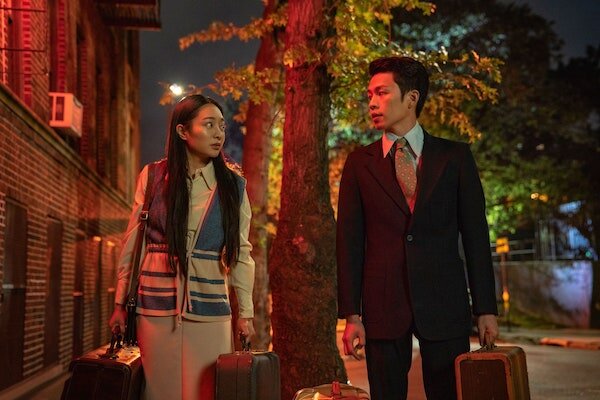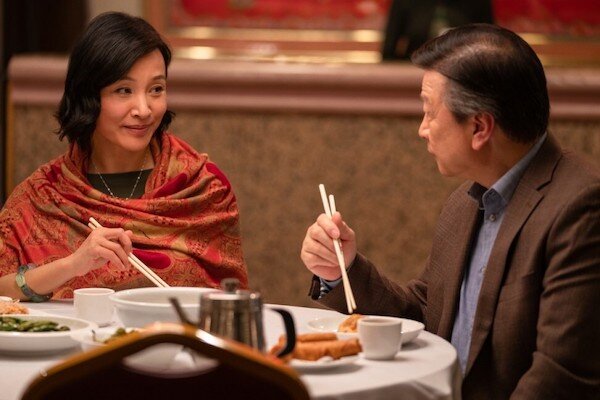Alan Yang’s personal and tender drama Tigertail follows a young boy as he leaves Taiwan for New York, grappling with decades of microaggressions and feelings many East Asian people can relate to. Explaining where cinema has gone wrong, and where things can still go right, Georgina Quach writes on the universal power of one brave story.
The first screen moment where I felt a sense of shame over the things that make us East Asians supposedly foreign – our language, our haircuts, our food, our fashion – was in John Hughes’ coming-of-age film Sixteen Candles. Gedde Watanabe plays Long Duk Dong, a foreign exchange student from an undefined Asian country. He first appears in the film hanging upside down from a top bunk bed, wiggling his eyebrows at Molly Ringwald’s Samantha as he says, “What’s happening, hot stuff?” She wastes no words responding to him; it’s not going to happen. A gong sounds off in the background. Although his role is comedic, the audience is not laughing with him, but at him and his seemingly backward, socially inept ways.
As shown by the stereotypically subservient detective Charlie Chan in the Charlie Chan films and the “Yellowface” scandal of Howard Barker’s play In the Depths of Dead Love (involving an all-white cast enacting a Chinese tale set in China), East Asian representation has historically been stilted by deeply entrenched stereotypes. Dismantling cinematic portrayals that strip Asians of humanity, Tigertail puts our humanity on screen. Written and directed by Master of None co-creator Alan Yang, the film spans multiple decades and countries, from 1950s Taiwan to present-day New York. Spoken almost entirely in Mandarin and Taiwanese by an all-Asian cast, the drama tells the underserved narrative of Yang’s community by showing it through family relationships and emotions. We trace the journey of factory worker Pin-Jui from his hometown in Taiwan to America, as well as the sometimes painful discord that separates us from those we love the most.
The portrayals of negative Asian tropes on screen can have damaging effects once taken outside the realm of film. “Asian-Americans who grew up in the second half of the 1980s complained that they were called ‘Donkers’ in junior and high schools,” Grace Ji-Sun Kim, a researcher at Georgetown University, wrote in the book Theological Reflections on 'Gangnam Style.’” They were taunted with quotes of Long Duk Dong’s English, such as ... ‘Oh, sexy girlfriend.’” When Donald Trump casually refers to a horrific global disease as “Kung Flu”, he conjures up images of the East Asian menace, descending from the dark history of “Yellow Peril” – a politicised fear that saw Asian people both as a threat to the white working class and unfit for citizenship in America. The Chinese Exclusion Act, 1882, was famously the first law in the US that curbed immigration solely based on race.
But for Asian Americans, there is an extra source of irony. The economic success of many Asian immigrants in America has created a contrasting stereotype: the “model minority” who are high-achieving, but lack charisma. While in some cases Asian Americans are wielded as a “model minority” against other groups, particularly other people of colour; in others, they are cast as “perpetual foreigners” who pose a threat to stability and order. In film, these scripts for East Asian behaviour chip away at the scope of what we can actually achieve, and how we can be seen. The “Chinese virus” slur reveals just how fragile acceptance of Asian Americans was. Under the cloak of “polite” society, racism expresses itself in subtle, persistent microaggressions.
One such emotion: reeling when someone stumbles in shock at my accent and says “I’m surprised you speak English so well” (doubly jarring given that studying medieval English formed a huge chunk of my English literature degree). Another: the sensation that rises up when I see an East Asian face on screen and brace for the ching-chong joke. Or another: when someone defends their stereotyping comment and I am forced to explain myself over and over, as though – in the same way a word repeated starts to sound like gibberish – I might eventually dismiss my truth as nothing.
All these minor feelings settle inside me and create a sense of lack, as if my body presents a clunkier blemished version of my actual self. Tibetan-born actress Kunjue Li, who plays Taiwanese immigrant Zhen Zhen in Tigertail, characterises that sense of lack as a “limp”. When she selects and auditions for roles, she must creatively wield her differences to her advantage and “work so much harder” in order to compete with her white counterparts. Li tells me, “Subconsciously I know I can’t go for a role [in the same way] that a white person can. I have to think of what I can bring – luckily my agent also thinks outside the box, so we pitch a very different angle. There are production companies that would rather say no or come up with excuses like ‘it has to be historical.’” Having left her hometown in China to attend university in London, Li could identify with Zhen Zhen’s feeling of isolation in a new Western community. “I would go to the launderette too, to smell the clothes,” she explains. “Most of the time, you’re just in your dorm and it can be quite lonely.” Li’s recognition as actress, producer and director at once reinforces the strength and perseverance of Asian creatives, reminding us that shifting this balance is well within our power.
In a cinematic landscape where diasporic narratives have been sidelined for too long, Tigertail shines as a glimmer of hope. The film meditates on the emotional minefield which greets many Asian immigrants in their newfound Western societies. To watch my own anxieties and everyday mundanities depicted by a similar working-class Asian family felt quietly radical.
Tigertail lays bare the complexity of the protagonist Pin-Jui’s interiority; the path he takes towards his American dream, how he stumbles and learns from his mistakes and how he grows from them. It splits between his life as a young man in the 1960s and the present day in New York. The film’s dual time frames reveal a mind shifting uneasily between a new, chosen culture and the one left behind. In the present-day timeline, an older Pin-Jui struggles to empathise with his daughter Angela, who has spent her life feeling as if she couldn’t talk to her father. I related to Angela, as someone who barely speaks to her parents about emotions because of a language and cultural barrier. This feeling of being pulled in two directions – between an ambition to integrate into our adopted culture and an ambivalence about that ambition – is instantly recognisable to all diaspora. Like Pin-Jui, my family paved new paths for successive generations, even if each generation is a little further from that original sacrifice, a little more removed from the country that was once home.
Alan Yang joins a wave of Asian American storytellers including Lulu Wang, Jenny Zhang, Ocean Vuong and Viet Thanh Nguyen who are liberating us from our pigeonhole existence as the suffering minority. Their works chart the expanse of immigrant identities, sexualities and feelings, and through this very act, they invent radical ways of loving ourselves in a hostile world where love is complexly bound up with power. This friction – of wanting to depict the struggles of the East Asian community without being entirely defined by them – is one central thread running through Cathy Park Hong’s book of essays Minor Feelings: An Asian American Reckoning. In “Stand Up,” Hong asks, “Will there be a future where I, on the page, am simply I, on the page, and not I, proxy for a whole ethnicity, imploring you to believe we are human beings who feel pain?” To be an Asian American writer, as Hong puts it, is to constantly live in fear that both your existence and your interpretation of that existence will always be read the wrong way.
Though Yang’s personal history inspired Tigertail, he underlined on Twitter that the film speaks to universal truths about family:
‘Tigertail is an immigrant story and a family story, but it’s also a story about passion and romance, elements that often get left out of the traditional Asian American narrative. I wanted to try to humanize us and show that we’re three-dimensional beings with emotional lives and interiority. Also one of my friends texted me telling me “how hot the young dad boy was.” I think she meant Hong-Chi Lee.’
For viewers who relate directly to Yang’s life experiences, I can only imagine he gives voice to so many of the emotions that have haunted them their whole lives. Tigertail unabashedly unfolds minor feelings hiding in its characters, but is not weighed down by them. The story carves out for East Asian immigrants the space to explore the innermost parts of ourselves – not just one part, but all the parts. I remember the verve for storytelling I felt at Oxford University when I published my first pieces, commissioned articles and met other young activists. For once, I had a face, a voice, a history, a consciousness, a rage. That rage is a major feeling, driving me to write stories in the very language used against me. Weighted against the present tide of anti-Asian bigotry, Tigertail’s human story of regret and loss is a powerful reminder that we deserve to have our feelings heard too.
Georgina Quach (@georginaquach) is a British-born Vietnamese journalist, with work in the Guardian and the TLS. She is compiling an archive of stories from Vietnamese refugees and fieldworkers on her personal website georginaquach.com.



